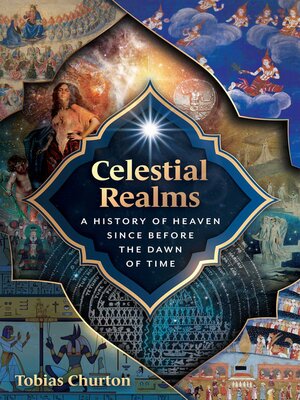
Sign up to save your library
With an OverDrive account, you can save your favorite libraries for at-a-glance information about availability. Find out more about OverDrive accounts.
Find this title in Libby, the library reading app by OverDrive.



Search for a digital library with this title
Title found at these libraries:
| Library Name | Distance |
|---|---|
| Loading... |
• Comprehensively explores the meanings, history, ideas, and experience of Heaven throughout the world's exoteric and esoteric traditions
Explores the heavens of Egypt, Mesopotamia, Greece, the Abrahamic traditions, Far Eastern mythologies, and Indigenous nations
Considers questions about our "need" for Heaven, further informed by popular culture, folklore, and personal experience
Across all ages people have wondered about the afterlife. Is Heaven a reward for good behavior, the home of the gods, or a state of being? As Tobias Churton reveals, such questions and beliefs about the nature of Heaven go back to humanity's earliest days.
Churton's exploration reveals a perennial search for spiritual meaning. Beginning with early civilizations, including mythology in ancient Mesopotamia, Egypt, and the Far East, we find sophisticated conceptions within philosophy and the Abrahamic religions, many of which persist unchanged. Churton examines the complexities of Jesus's teaching that "the Kingdom of God is within you," and Islam's ideas about paradise. He analyzes the beliefs of eastern mystics, Maori, Australian Aboriginal, and Polynesian traditions as well as heavenly conceptions among Indigenous cultures of the Americas. Readers will explore Renaissance-era understandings of Heaven's connection to the body in the chemico-spiritual medicine of Paracelsus and mysticism of Jacob Böhme. Emmanuel Swedenborg, followed by William Blake, controversially associated Heaven with sexuality. Churton then takes us into the contemporary era, exploring Heaven from perspectives of "spiritualism," psychedelic experience, communist materialism, and the arts, including John Lennon's lyrical suggestion that we imagine that there is no heaven.
Whether Heaven is considered a specific place or a deeply felt state of being, this in-depth investigation emphasizes its resonance and significance for all people.
Across all ages people have wondered about the afterlife. Is Heaven a reward for good behavior, the home of the gods, or a state of being? As Tobias Churton reveals, such questions and beliefs about the nature of Heaven go back to humanity's earliest days.
Churton's exploration reveals a perennial search for spiritual meaning. Beginning with early civilizations, including mythology in ancient Mesopotamia, Egypt, and the Far East, we find sophisticated conceptions within philosophy and the Abrahamic religions, many of which persist unchanged. Churton examines the complexities of Jesus's teaching that "the Kingdom of God is within you," and Islam's ideas about paradise. He analyzes the beliefs of eastern mystics, Maori, Australian Aboriginal, and Polynesian traditions as well as heavenly conceptions among Indigenous cultures of the Americas. Readers will explore Renaissance-era understandings of Heaven's connection to the body in the chemico-spiritual medicine of Paracelsus and mysticism of Jacob Böhme. Emmanuel Swedenborg, followed by William Blake, controversially associated Heaven with sexuality. Churton then takes us into the contemporary era, exploring Heaven from perspectives of "spiritualism," psychedelic experience, communist materialism, and the arts, including John Lennon's lyrical suggestion that we imagine that there is no heaven.
Whether Heaven is considered a specific place or a deeply felt state of being, this in-depth investigation emphasizes its resonance and significance for all people.







